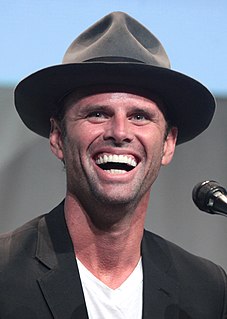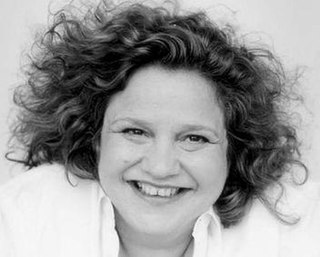A Quote by Michael Frayn
I've never written a fiction before about real people. . . . I read everything that I could find by people who met them and tried to get some impression of them, but as always when you write fiction, even if you have completely fictitious characters, you start by thinking of what is plausible, what would they say, what would they be likely to do, what would they be likely to think. At some point, if it is every going to come to life, the characters seem to take over and start speaking themselves, and it happened with [COPENHAGEN].
Quote Topics
About
Always
Before
Characters
Come
Copenhagen
Could
Even
Every
Everything
Fiction
Fictitious
Find
Get
Going
Happened
Impression
Life
Likely
Met
Never
Over
People
Plausible
Point
Read
Real
Real People
Say
Seem
Some
Speaking
Start
Take
Them
Themselves
They Say
Think
Thinking
Tried
Would
Write
Written
Related Quotes
Everybody should read fiction… I don’t think serious fiction is written for a few people. I think we live in a stupid culture that won’t educate its people to read these things. It would be a much more interesting place if it would. And it’s not just that mechanics and plumbers don’t read literary fiction, it’s that doctors and lawyers don’t read literary fiction. It has nothing to do with class, it has to do with an anti-intellectual culture that doesn’t trust art.
There's definitely some pieces in there that reflect on my personal life, but really, they aren't as personal as everybody thinks they are. I would like them to be more personal. The emotions, the songs themselves are personal. I can't do it - I've tried to write personally and it just doesn't seem to work. It would be too obvious. Some things that you could read in could fit into anyone's life that had any amount of pain at all. It's pretty cliche'.
I take it as a real compliment that people believe that I can in some ways mine the disenfranchised, the marginalized, the somewhat off-center - psychologically speaking - people in our society, and bring a real humanity to them, and make people see what would otherwise be a person that you would hate. Find a reason to love them and see the world from their point of view.
I have always been intensely uncomfortable with the idea of a science fiction writer as prophet. Not that there haven't been science fiction writers who think of themselves as having some sort of prophetic role, but when I think of that, I always think of H.G. Wells - he would think of what was going to happen, and he would imagine how it would happen, and then he would create a fiction to illustrate the idea that he'd had. And no part of my process has ever resembled that at all.
When I start, I have a feeling for the characters, and maybe the shape of the story. Sometimes I might even have the last sentence in mind. But, no book I've ever written has ever ended the way I thought it would. Characters disappear, others come forward. Once you start writing, everything changes.
I very much write from characters. Those people start speaking, and then I have them in the house with me and I live with them. Then at some point, it's time to get them out of the house. You can only live with someone like Dr. Georgeous Teitelbaum from THE SISTERS ROSENSWEIG for so long, and then it's time for her to go. But it is very like having the company of these people and trying to craft them in some way into a story.
The thing about great fictional characters from literature, and the reason that they're constantly turned into characters in movies, is that they completely speak to what makes people human. They're full of flaws as much as they are full of heroics. I think the reason that people love them and hate them so much is because, in some way, they always see a mirror of themselves in them, and you can always understand them on some level. Sometimes it's a terrifyingly dark mirror that's held up.
You start to stress yourself out about the people around you. You start to think, like, "What do you really want from me?" And then you forget that you, at some point, asked them for something. At some point you needed them to take you in because you ain't had nowhere to go. And now you turn around and question their loyalty to you, and those were the only people loyal to you. The only people that really loved you are still there, and you tanked on them. I'll never let that happen.
We would never move forward in the face of negative emotion. There are many people who would teach you otherwise. They say, you've got to face fear to get over it. And all they do is desensitize themselves to the point that they get themselves into situations where they have no idea what's going on, and the end of them comes rather abruptly... And then everyone calls them brave.
You can, in short, lead the life of the mind, which is, despite some appalling frustrations, the happiest life on earth. And one day, in the thick of this, approaching some partial vision, you will (I swear) find yourself on the receiving end of - of all things - an "idea for a story," and you will, God save you, start thinking about writing some fiction of your own. Then you will understand, in what I fancy might be a blinding flash, that all this passionate thinking is what fiction is about, that all those other fiction writers started as you did, and are laborers in the same vineyard.
Great fiction has been written out of the very darkest circumstances of our narco violence, and nothing written in either fiction or nonfiction has penetrated that darkness so memorably - you can even say beautifully, a relentless riveting forensic dark beauty that some readers in fact find themselves unable to endure - as Roberto Bolaño's 2666. Especially in "The Part about the Crimes." But here's the thing: nobody would call 2666 a "narco novel."
Okay, this is Fran Lebowitz. She gave an interview once for the Paris Review about trying to write fiction and saying that fiction writers start talking about how characters are talking to them, and it's crazy, she's never had that. And I also thought, I'm never gonna be able to do this, because I didn't feel that for a really long time.
As I get older I find myself thinking about stories more and more before I work so that by the time I eventually sit down to write them, I know more or less how it's going to look, start or feel. Once I do actually set pencil to paper, though, everything changes and I end up erasing, redrawing and rewriting more than I keep. Once a picture is on the page I think of about ten things that never would have occurred to me otherwise. Then when I think of the strip at other odd times during the day, it's a completely different thing than it was before I started.







































